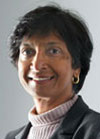 WHEN former South African president Nelson Mandela was languishing in prison, he had no access to a lawyer.
WHEN former South African president Nelson Mandela was languishing in prison, he had no access to a lawyer.
The officer commanding Robben Island Prison did not allow Mr Mandela or the other prisoners to seek legal advice.
In stepped a woman lawyer.
Mrs Navanethem Pillay was then the first non-white to open her own law firm in the Natal province.
She had by then won victories for prisoners of apartheid, including her husband, and was a champion for women's rights.
In 1973, she took on the might of the Robben Island's prison authorities and won Mr Mandela and his fellow political prisoners access to lawyers.
Her legal battle also exposed the appalling conditions actually prevailing on Robben Island at the time.
Such activities did not go down well with the government.
She was for many years denied a passport. She was also on a list compiled by the Bureau of State Security which ranked her along with Archbishop Desmond Tutu as a serious risk to the apartheid regime.
But Judge Pillay's actions also caught the eye of the UN. On Friday, the 67-year-old, who has a Harvard law degree, was named the new UN High Commissioner of Human Rights.
She will succeed Ms Louise Arbour of Canada who completed her five-year term on 30Jun.
UN Secretary-General Ban Ki-moon had told the General Assembly his intention to appoint Judge Pillay, who has served since 2003 as a judge on the International Criminal Court in TheHague.
It has not been an easy route to success for the South African woman of Tamil descent.
As a member of a minority from an impoverished Indian neighbourhood in apartheid-era South Africa, the colour of her skin long kept her from becoming a judge, reported the Los Angeles Times.
For years, even though she was a lawyer, she could not even sign a contract without her husband's consent.
But Mr Mandela, who had come to know her during her visits to Robben Island prison, named her in 1995, after he became president, as the first non-white for the country's High Court.
'Judges were all white and male,' Judge Pillay said in a telephone interview from South Africa.
'The first time I entered a judge's chambers was when I entered my own.'
Though some question whether she can abandon her studied impartiality to become an activist for the world's oppressed, she says she has learned to discount the doubters.
'When you are appointed to a public position in the public glare, all people see is that there is someone new who is different from the norm, and wonder is she really able to do this job.'
She said a lifetime of facing injustice has made her sensitive to victims.
HUMBLE BACKGROUND
Her impoverished community collected money to pay for her university tuition, said the daughter of a bus driver, and planted in her the determination to give something back.
She made a name for herself in South Africa as a lawyer defending abused women and opponents of the apartheid regime.
Judge Pillay said she is ready to stand up against violators in instances where it would be impolitic for UN Secretary- General Ban Ki-moon to speak out.
For example, on a recent visit to Myanmar to ensure aid for cyclone victims, Mr Ban declined to call for the release of democracy leader Aung San SuuKyi.
'The high commissioner must be the fearless and consistent voice for the rule of law, justice, peace and human rights,' she said.
'I think it can only complement the secretary-general's position to have someone fairly independent and vocal speaking on these issues. He is in a more difficult position. People have different styles, but they still get things done.'
On the International Criminal Tribunal for Rwanda, she presided over landmark cases in international law that established mass rape as a form of genocide, convicted a former head of government for crimes against humanity and prosecuted media for inciting genocide.
She also co-founded Equality Now, a New York-based international women's rights organization.
Before she was nominated as UN Commissioner, US diplomats made it clear to the UN Secretary General that she was not their first choice. They were concerned about her management skills and positions on abortion rights.
With the announcement of the nomination delayed four days after it was expected, UN corridors buzzed with questions of whether it had been derailed.
But the timing was just a matter of checking with member states and human rights groups, UN spokesman Marie Okabe said.

No comments:
Post a Comment